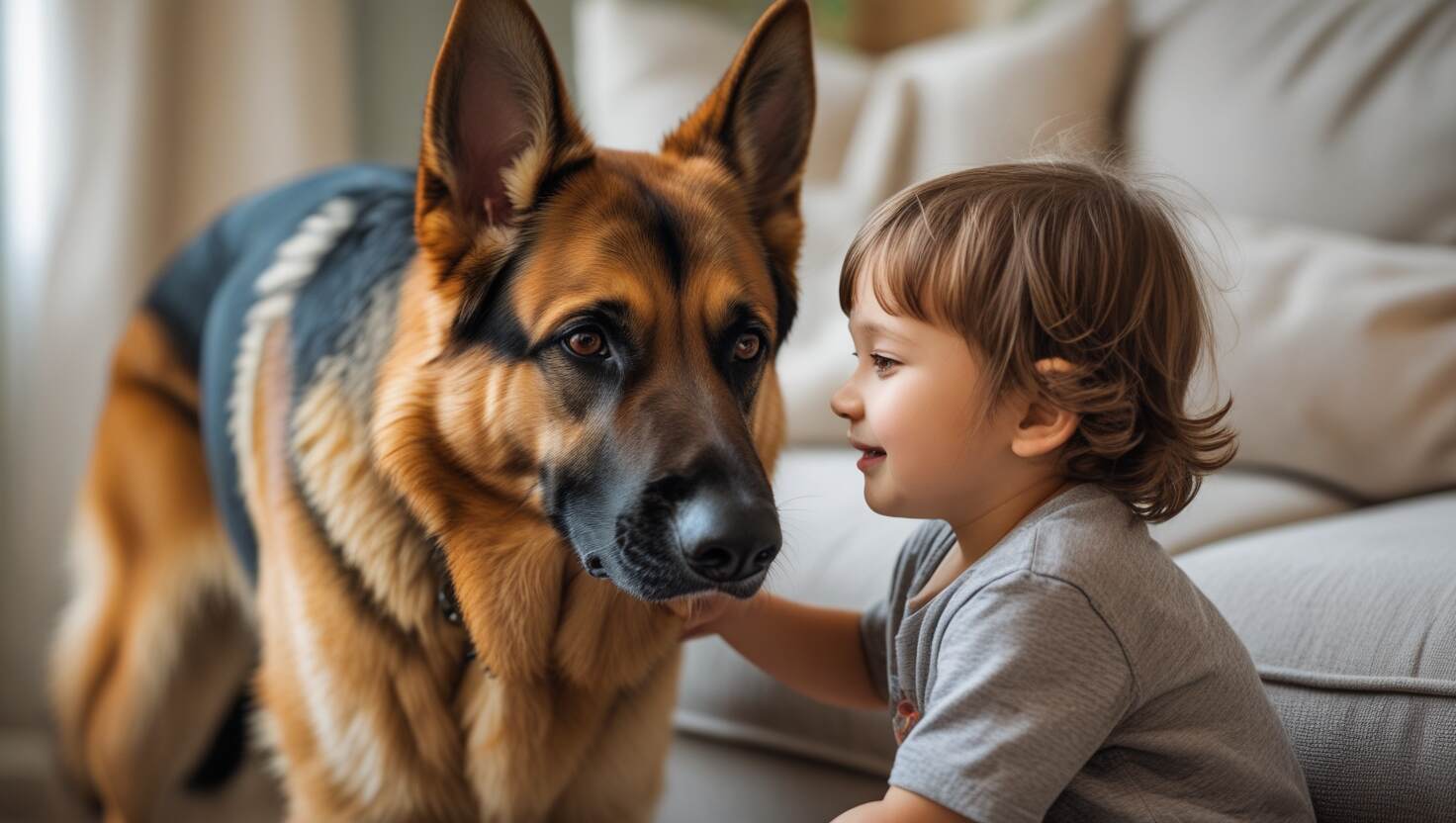Are German Shepherds Good With Kids?
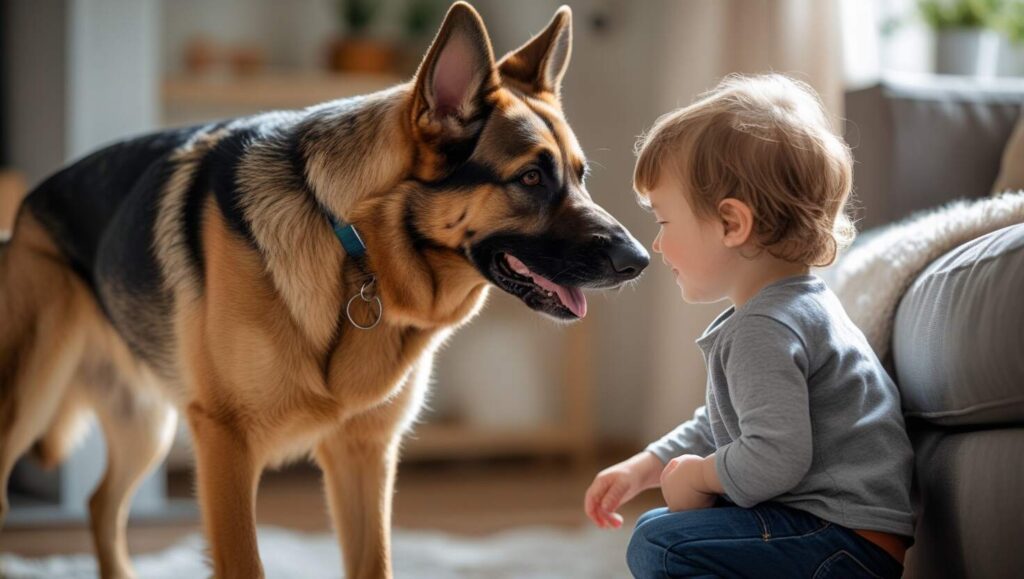
German Shepherds are loyal, intelligent, and protective dogs that can be great with kids when properly trained and socialized. They require early training, exercise, and supervision to ensure safe interactions with young children. With the right care and respect, they become loving family companions and gentle playmates while maintaining their natural guarding instincts.
Understanding Their Temperament
German Shepherds (GSDs) are known for their intelligent, hard-working nature, and strong loyalty to their families. They are highly trainable and can be child-friendly when properly socialised and trained from a young age. Despite their large size and strong instinctive drive, they can be very gentle and affectionate with children, making them wonderful playmates in many cases. However, their herding background means they might occasionally nip at heels during playtime, which is not an act of aggression but rather an instinctive behavior that can be corrected with proper training.
These dogs have natural protective instincts and are often wary of strangers, which makes them excellent guard dogs. However, this can also mean they need early socialization to prevent unpredictability in their temperament. The American Temperament Test Society (ATTS) found that GSDs have an 85.3% pass rate, which is higher than the average of 83.4% across all breeds. A well-trained and well-socialised GSD will not act aggressive unless threatened or in pain. Some GSDs, like Gavel, even flunked out of police academy in 2017 because they were too nice, proving that temperament varies by individual dog.
While GSDs can be great family pets, their size and self-confident nature mean that young children should not be left unsupervised when interacting with them. Even a playful jump or accidental push can be overwhelming for a child. Simple steps, such as teaching a GSD to sit before receiving their bowl of food or using a 6-foot leash during walks, can help reinforce good behavior. Proper training, a valid routine, and an enclosure when needed will ensure they grow into well-behaved members of the house. According to Greencross Vets, early training with games, humour, and positive reinforcement can help create a lifetime of love, happiness, and a well-adjusted dog that thrives in a family environment.
Protective and Loyal Nature
German Shepherds are one of the top 5 most loyal breeds, making them an ultimate guard dog for families. Their protective instincts are strong, and they will naturally defend their loved ones, including kids, if they sense danger. There are millions of homes that trust these intelligent, obedient dogs for protection. I once saw a beautiful female GSD at the beach with her family, and when a large dog started running towards her niece and nephew, she immediately charged and chased the threat away. This is a common FACT—GSDs do not hesitate when their members are at risk. Their muscular frame and ability to jump over a 5′ fence show their natural strength, but when properly socialized and trained, they can be both gentle and affectionate with young children.
From the time a puppy is 12 weeks old, they can be taught important commands like sit, speak, and retrieve an object. I knew a GSD that could even flip light switches on command! These dogs have a unique 7th sense, detecting when their people are sad or in pain—some even assist the disabled or recognize a migraine before it happens. A well-trained GSD understands rules, enjoys activities, and becomes a devoted friend for life. Whether male or female, a properly neutered, socialized, and well-trained GSD is less likely to be aggressive or attack without reason. Socializing and training from an older age may be harder, but starting young makes it much easier to shape them into the best family dog.
Are They a Good Family Dog?
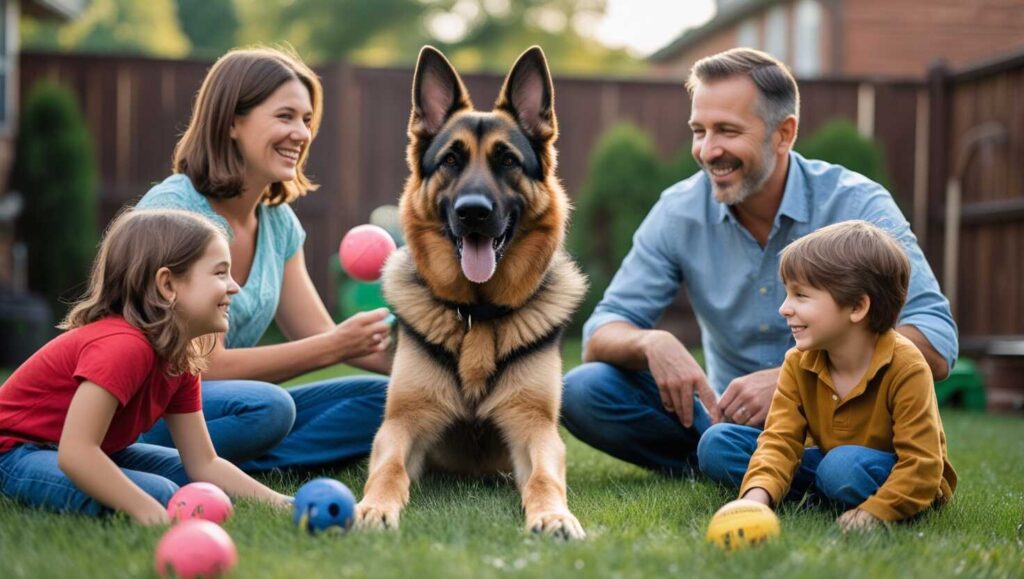
Bringing a German Shepherd (GSD) into a household with young children is a big decision that should not be taken lightly. This breed is a wonderful choice for a family, as they are incredibly intelligent, highly trainable, and naturally protective. They make great playmates, full of energy, always ready for running and playing, but they require proper socialization and structure to maintain harmony. The American Kennel Club ranks them as the fourth most popular dog, and for good reasons—they are loving, patient, and form a strong bond with their owners. Whether a fluffy pup or a fully grown GSD, they thrive when given clear guidance and routine. However, their large size and stamina require a matched level of exercise to keep them healthy and content.
Despite being an almost perfect pooch for many families, there are a few considerations before making the commitment. Some insurance companies have them on a blacklist, which can result in higher premium rates or even coverage denied. While they are incredibly friendly to their family, their natural instinct to watch over their loved ones can make them approach strangers with caution. Every individual dog is different, and some may develop negative traits if not properly socialized from a young age. A well-trained GSD will never hurt anyone intentionally, but their strength could accidentally cause harm if they are not taught proper manners. The key point to remember is that early training and positive reinforcement will shape them into a loyal, entertaining, and well-behaved lover of their family.
Living with a German Shepherd
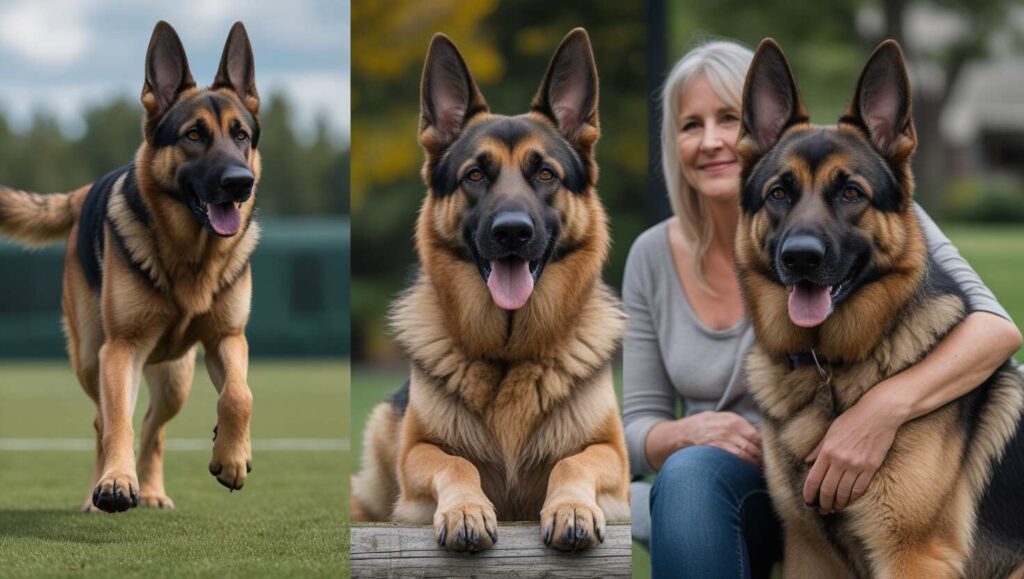
Are German Shepherds Good in the Home?
German Shepherds are incredibly loyal, kid-friendly, and protective, making them great additions to a harmonious household. When properly raised, they build a strong bond with children and other pets, including feline companions. However, if a puppy comes from a poorly-bred background or is under-socialized, they may become high-strung, nervous, and difficult to train. When choosing a GSD, it is important to focus on responsible breeders who ensure proper socialization from a young age. Their large size and energy levels can be overwhelming for small kids, but with clear boundaries, training, and mental stimulation, they grow into well-behaved and wonderful family companions.
Are German Shepherds Good With Strangers?
A well-socialized GSD is confident, friendly, and knows when to be relaxed or alert. While they are naturally protective, they are not automatically aggressive toward strangers unless they sense a threat. Their demeanor can seem scary due to their strong appearance, but this does not mean they are unsafe. Many GSDs react to unfamiliar smells and noises by barking, which can seem intimidating but is simply their way of acting as a guard. They are trained in police work because of their ability to determine threats accurately. However, if left without proper socialization, they can become overly wary or defensive. Teaching them how to behave around new people, rewarding gentle behavior, and exposing them to different environments will help them remain friendly and well-adjusted.
Are German Shepherds Good With Children?
GSDs can be amazing playmates for children, but they need to be taught respect and proper behavior. They should not be allowed to disturb family members while they rest, eat, or engage in activities that shouldn’t be interrupted. Older kids can help train them by giving clear commands, while younger ones should always be supervised when involving the dog in play. Since they are highly intelligent, they enjoy learning obedience tricks, which helps strengthen their bond with the family. A GSD that is treated with care and respect will grow into a gentle, protective, and well-behaved companion, making them one of the best choices for an active, loving family.
Socialization & Training
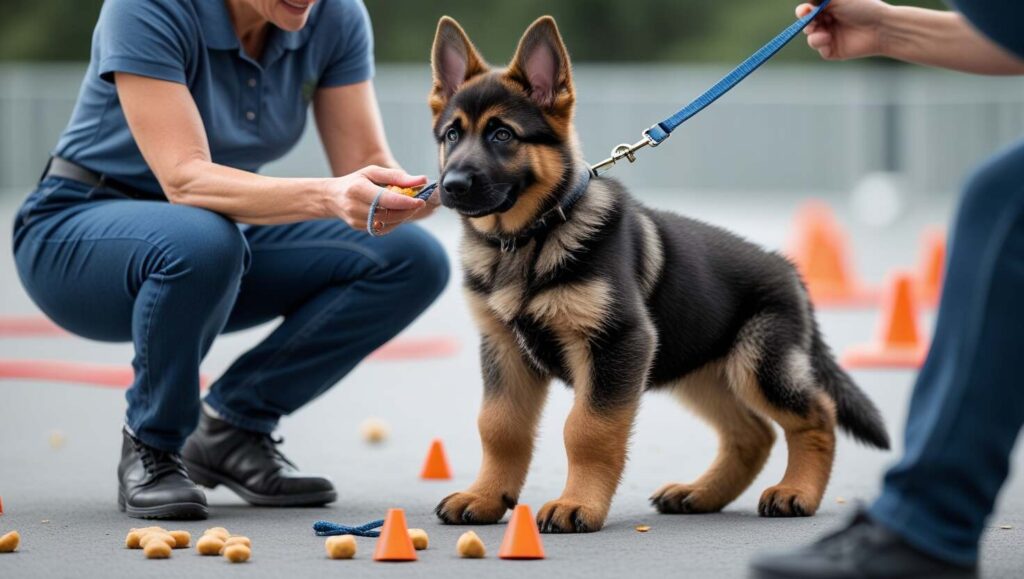
The Role of Socialization
When you adopt a German Shepherd puppy, proper socialization from an early life stage is essential to ensure they grow into a well-adjusted, calm dog. Socializing means exposing them to a variety of people, pets, and situations so they become familiar with different animals, places, and experiences. This helps build trust, confidence, and self-assurance, preventing them from becoming shy, fearful, or overly aggressive as they mature into an adult. A young GSD that is safely introduced to new sights, noise, and sensations will be more adaptable and less likely to develop aggression or insecure behavior.
Since this breed has natural prey instincts, proper socialization is a must to prevent them from seeing small animals as threats. Introducing them to older dogs and allowing them to interact with friends in controlled environments will help them feel at ease around others. Without valid exposure, a GSD can become scared, which may lead to improper reactions. However, with patience and encouragement, their curiosity and courage will shine, shaping them into confident, friendly companions.
Effective Training for Your German Shepherd
German Shepherds (GSDs) are one of the best breeds for family life, but their trainability depends on early training and socialization. This intelligent working dog is often employed in service and police roles because they learn commands and tasks quickly. A younger GSD benefits from short, multiple sessions daily, keeping training fun and positive. Start with basic obedience, like sit, stay, come, heel, and lay, using rewards, treats, and praise to reinforce good behavior. In one session, gently guide your pet by holding a treat above their head so they instinctively raise their nose and lower their bottom to the floor in a sitting position, then reward them immediately.
A proper routine includes crate training, leash manners, and managing separation anxiety. It’s recommended to introduce them to a variety of places and people to help them become reserved yet confident. Puppies can get distracted, so keeping each session minutes long is key. Using positive reinforcement like petting and chews can reduce stress and help them relax their muscles before sleep. A professional trainer or obedience classes may benefit those needing extra guidance. Owners should also practice different techniques at home and advise family members to follow the same training methods for consistency. Staying upbeat and standing ready will help your GSD learn successfully while making training a rewarding experience.
Teaching Kids to Interact Properly
Helping children learn how to interact with a German Shepherd is important for a safe and happy home. Kids should respect the breed by using basic commands and gentle petting instead of tugging on ears, tail, or skin. They must not bother the dog during mealtimes or try to ride on its back. Short training sessions with treats can help them associate good behavior with fun and prevent unpleasant situations.
Parents should teach kids to safely approach the dog and avoid loud noises that might startle it. If a Shepherd shows signs of aggression, like growling, snarling, barking, or lunging, they should not provoke it. Watching for stiff, rigid stance, wide eyes, and exposed teeth can help family members recognize discomfort. With controlled interactions, kids and GSDs can build a bond through stroking, obedience training, and positive play.
Safety Considerations & Supervision
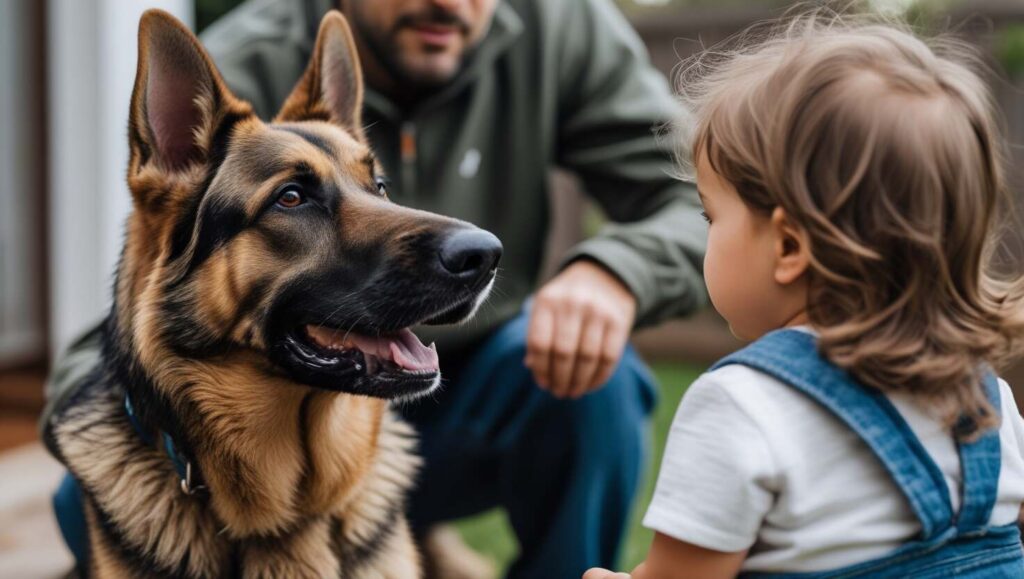
Keeping Kids Safe Around a German Shepherd
Even the best-trained German Shep should be supervised when around young children, especially a toddler who may not understand how to respectfully interact. Some dogs are more gentle and tolerant, while others may feel overwhelmed if yanked by their fur or disturbed while eating or sleeping. Parents should teach kids to approach the dog calmly and never grab handfuls of fur, preventing unpleasant situations.
I once investigated a case where a Shep let a child pull at its coat until a bald patch appeared, only reacting when it let out a yelp. While this breed is protective and makes great friends, even the most trained dog can react unpredictably if it feels threatened. Every dog has a unique personality, so it’s important to assess each individual GSD’s behavior before leaving them alone with kids.
Identifying and Preventing Problems
Being aware of signs of stress or discomfort in a German Shepherd is important for a child’s safety. If a dog is growling, snapping, hiding, or refusing to listen to commands, it may feel threatened or uncomfortable. Some behaviors, like barking, nipping, or circling, can be warnings, especially in an excited state. If an adopted GSD has had past experiences that make them more scared, it’s best to supervise all interactions and assess their temperament carefully.
Kids playing, running, or screaming can startle a GSD, leading to accidental knockdowns, especially with larger breeds. Some dogs may jump in greeting or lick faces, but if they feel physically overwhelmed, they might react negatively. To stop an unpleasant situation, always watch how the dog is approached and, if needed, separate them before things escalate. If there is worry about their trainability, a professional can assess and help with valid training techniques to ensure a safe environment.
German Shepherds & Babies
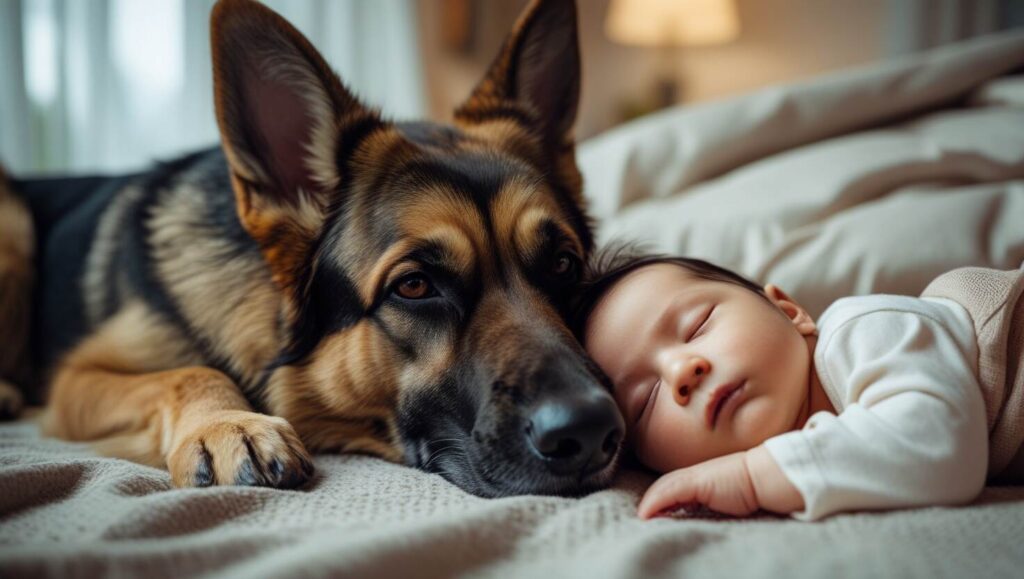
Are They Safe for Babies?
Like all dogs, a German Shepherd’s behavior depends on its personality, training, and how well it was raised. While the breed is naturally protective, some bad apples exist, so it’s important to pick a puppy from a trusted breeder and start early training. A well-trained GSD can be serious when needed but also have fun around family.
I once attended free classes in a city auditorium, where trainers taught people how to train large dogs, including a Doberman and a GSD. Everyone watched their antics as they learned the basics of behavior. A GSD that stands out as one of the greatest family dogs is often born with a good temperament and shaped with the right guidance.
Bringing a German Shepherd and Newborn Together
A German Shepherd can naturally be curious about a newborn, wanting to discover new sounds, smells, and movements. Before bringing the baby home, allow the dog to get familiar with baby items and colors. When introducing them, always monitor their interactions and ensure they are gentle and calm.
Over time, a Shepherd will accept the little one as part of the family and may even protect them. As the child grows, teach them to respect the dog’s space, use soft petting, and never leave them alone together. With patience, they can form a safe, loving bond and enjoy playing as they both grow.
Care, Exercise, and Lifestyle Needs
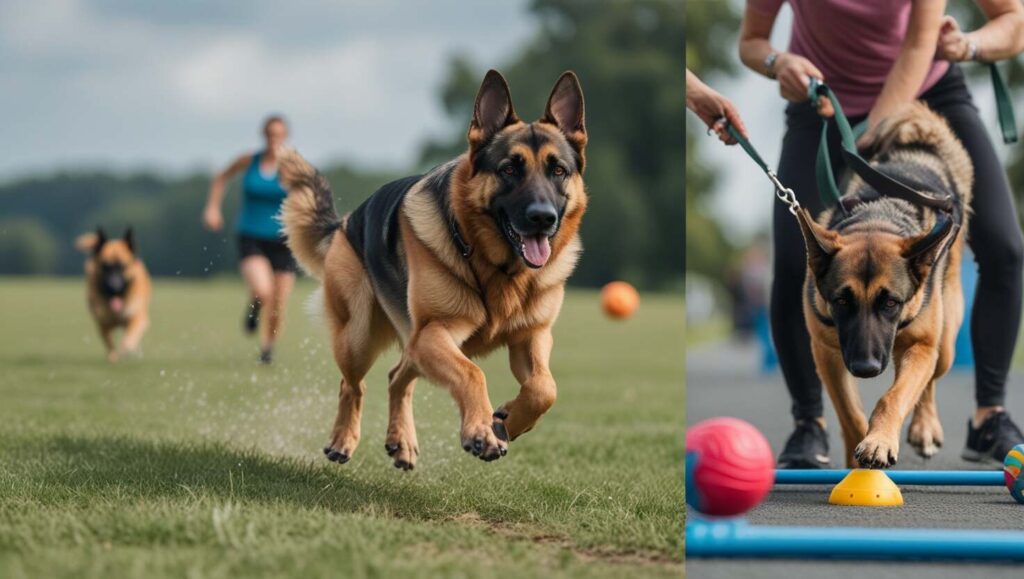
Keeping a German Shepherd Active and Engaged
A German Shepherd is a working dog with high energy, and without proper exercise and mental stimulation, they may develop undesirable behavior like excessive barking or destruction. Daily walks, play sessions, and toys that challenge their intelligent brain are essential. A mix of physical activity and problem-solving games keeps them content and prevents them from feeling cooped up.
If they don’t burn their stored energy, they may become jumpy, snippy, or even try to escape. Rough play with small kids can lead to accidents where a child gets knocked over or jumped on. To avoid frustration and anxiety, they need at least an hour of exercise daily, a protein-rich diet, and time outside to stay fit and happy.
Essential Care & Health for a German Shepherd
A German Shepherd is a large breed, standing 22 to 26 inches tall and weighing between 50 to 90 pounds. Their high-energy nature means they need extensive exercise and playing to stay healthy and happy. Whether you adopt a younger puppy or an older dog, both have their pros and cons. A puppy requires more training, while an older dog may already be well-socialized. Many owners wonder, When do German Shepherds stop growing? Generally, they reach their full height by 12 to 18 months, but their muscles and weight continue to develop until around two years of age. Their lifespan is 7 to 10 years, so providing them with a good life full of opportunities for physical and mental stimulation is key.
Since GSDs have a double coat, they shed a lot, leaving loose hairs on furniture and clothing. Regular brushings and an occasional bath help manage shedding. Nail trims and dental care are also essential for their health. Choosing a reputable breeder with proper screening can prevent common health issues like hip dysplasia, eye problems, and bloat, which can be life-threatening.
To keep them satisfied, GSDs need more than just leash walks. Agility training, tracking competitions, and swimming are great ways to let them run and burn steam. They are natural-born learners and can be taught advanced tricks. Interactive toys, treat puzzles, and cognitive challenges help keep their minds sharp, preventing destructive behaviors and ensuring they stay intrigued and entertained.
Knowing the Possible Risks
Because of their history in the police and military, German Shepherds are often seen in television and movies as aggressive attack dogs. But the reality is different—a well-trained and socialized GSD is a loving family dog. However, each individual has a unique personality, shaped by past experiences. If they feel threatened, startled, or uncomfortable, they may show behaviors like barking, nipping, or growling.
To keep interactions safe, children should be taught to respect the dog’s space. They should never startle a sleeping dog, interrupt while it’s eating, or invade its rest area. Physically disturbing a dog can lead to it refusing commands or reacting out of confusion. It’s important to make kids aware that every breed has different personalities and that teaching them how to act around dogs prevents problems.
If a GSD shows dangerous behaviors, a professional should assess their temperament and trainability. If a dog has been adopted, owners should prioritize proper socialization to ensure they feel safe. When a dog’s space is respected, and they receive proper training, they will thrive as a well-adjusted family pet.
Final Thoughts
German Shepherds are loyal family dogs that can be great with kids when given proper training and socialization. While they have a reputation for police work, this does not mean they are naturally aggressive or likely to attack. Their nature depends on how they are raised and if they are treated with respect. Like all breeds, they need their space, time to rest, and should not be interrupted while they eat. If people believe in stigmas or stereotypes, they should consider studies and seek opinion from a veterinarian or a trainer to determine if a GSD is the right choice for their circumstances.
Kindly note: The content shared in this blog is gathered from online sources, some of which may not be verified. For accurate guidance on caring for your dog, it is recommended to seek advice from a qualified veterinarian.

